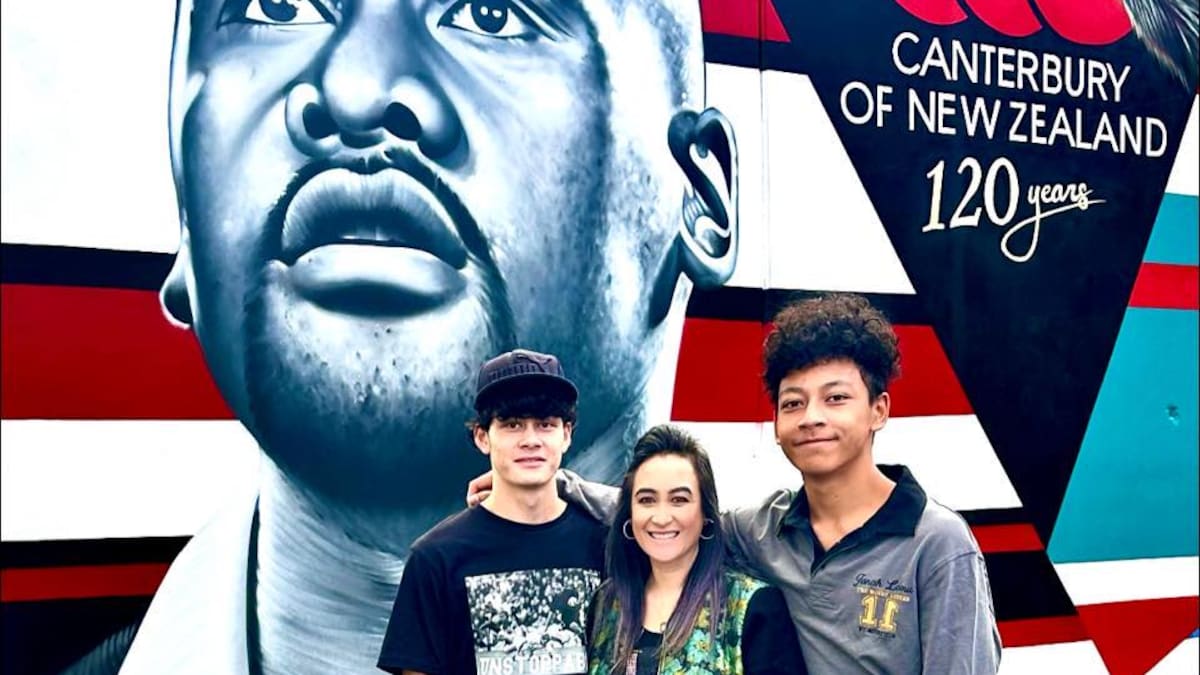But the book has gotten offside with Nadene Lomu who told the Herald neither the author nor Rockpool Publishing contacted her over the use of her late husband’s trademark.
In 1997 Lomu trademarked his own name, image and persona as intellectual property and registered it under his company Stylez Limited.
Nadene Lomu has full control of the Lomu trademark, and its use. She believes it has been breached for “commercial purposes” and is considering all her legal options.
She is also upset about the unrelated online sale of T-shirts featuring the rugby great’s face and branded the ‘Lomu Tee’.
AdvertisementAdvertise with NZME.
Lomu, 40, died in 2015 from a heart attack caused by kidney failure.
“The Intellectual Property Office of New Zealand exists for anyone and everyone to see where ownership rights sit. Yet it’s blatantly obvious people choose to ignore it,” Lomu told the Herald, calling it “Trademark 101″.
I’m over people constantly exploiting Jonah, thinking they can use him to fill their pockets
Nadene Lomu
“The boys and I are well aware that tributes will always be made about their dad – and deservingly so, but here are two examples of where moneymakers should have known better.
“I’m over people constantly exploiting Jonah, thinking they can use him to fill their pockets. No one owns the rights other than Brayley, Dhyreille and myself.
“I would never steal another person’s rights and family possessions the way people keep doing this to us and taking from our sons. It’s a disgrace and enough is enough.
Nadene Lomu with her and Jonah’s teenage sons Brayley and Dhyreille.
“This is where the power of trademarks is truly underestimated, but let me clarify this … Both examples provided are unlawfully infringing upon our trademark ownership rights, and we are sick of it!”
The family learned of the book when one of her boys last weekend spotted it in a bookstore shortly after it was released in early July, Lomu said.
Jonah Lomu scoring a try against Australia in Wellington, 1996. Photo / Nigel Marple Collection.
She added anyone who wanted to use Lomu’s likeness for any commercial purposes should be seeking the legal permission to do so; that would include approaching her as she controlled Lomu’s trademark.
Wall referred all queries to the publisher.
Dennington said the book was a tribute, never intended to cause upset.
AdvertisementAdvertise with NZME.
Dennington did not know if Wall had spoken to the Lomu family, or lawyer Chris Darlow, the executor of the Lomu estate.
He said he would be happy to discuss the matter with them.
Nadene Lomu said the author and publisher should have known better.
She believed the use of Lomu on the cover and in the book was an example of her and the rugby great’s legal rights “being stomped on”.
The online apparel sales also breached the Lomu trademark, she said.
Nadene Lomu also claims this organisation has breached the Lomu trademark with their T-shirts.
“Respecting someone isn’t selling them out without the legal permission to do so,” she said.
AdvertisementAdvertise with NZME.
“Perhaps instead of sweeping the dust on my floors, it’s time to sweep up the outside trash, and hold these people liable for damages.
“Maybe, they should do their homework before commercialising on Jonah without the legal permission to do so because ignorance is a weak excuse and not a valid defence against trademark infringement.”
Nadene Lomu had a dispute with her lawyer Chris Darlow then issued a reconciliation letter.
Dr Victoria Argyle, Special Counsel at AJ Park, Intellectual Law Services, told the Herald the trademark abuse claims would be hard legally to stack up in the case of The Immortals of New Zealand Rugby.
Lomu’s claims were not cut and dry.
The registered patent attorney said the issue was whether Lomu’s name was being used in the book as “a trademark, or in any other way that suggests authorisation, or simply as his name”.
The book did not use Jonah Lomu in its name, and neither was his name – or claims of authorisation – used in advertising materials.
AdvertisementAdvertise with NZME.
While Argyle hadn’t read the book, it appeared to be “an independent story showcasing 15 New Zealand All Black players generally regarded as some of our best players”.
In that case, legally, it was “an example of a fair and descriptive use to legitimately refer to an historic figure and former rugby legend”.
“It does not appear to be doing anything that would mislead consumers, including as to its source. Thus, there is little that Nadene can do here to prevent the use of his name in this book.”
Amicable decision on Lomu trademark
Lomu’s dispute with lawyer Chris Darlow has also been resolved.
Darlow and Nadene Lomu had been involved in a legal dispute surrounding the estate and who is responsible for managing Lomu’s assets, including intellectual property rights related to his name and image, including the production of a documentary about his life.
“Braylee, Dhyreille and I are extremely pleased to announce that after almost a decade since our devastating loss of our beloved Jonah, our hearts will never be the same; however, Chris Darlow and I with the support of Braylee and Dhyreille have reconciled our differences amicably,” Nadene Lomu said.
AdvertisementAdvertise with NZME.
Darlow added: “I’m unable to speak to the media further on Lomu matters.”
Joseph Los’e is an award-winning journalist and joined NZME in 2022 as Kaupapa Māori Editor. Los’e was a chief reporter, news director at the Sunday News newspaper covering crime, justice and sport. He was also editor of the NZ Truth and prior to joining NZME worked for urban Māori organisation Whānau Waipareira.

